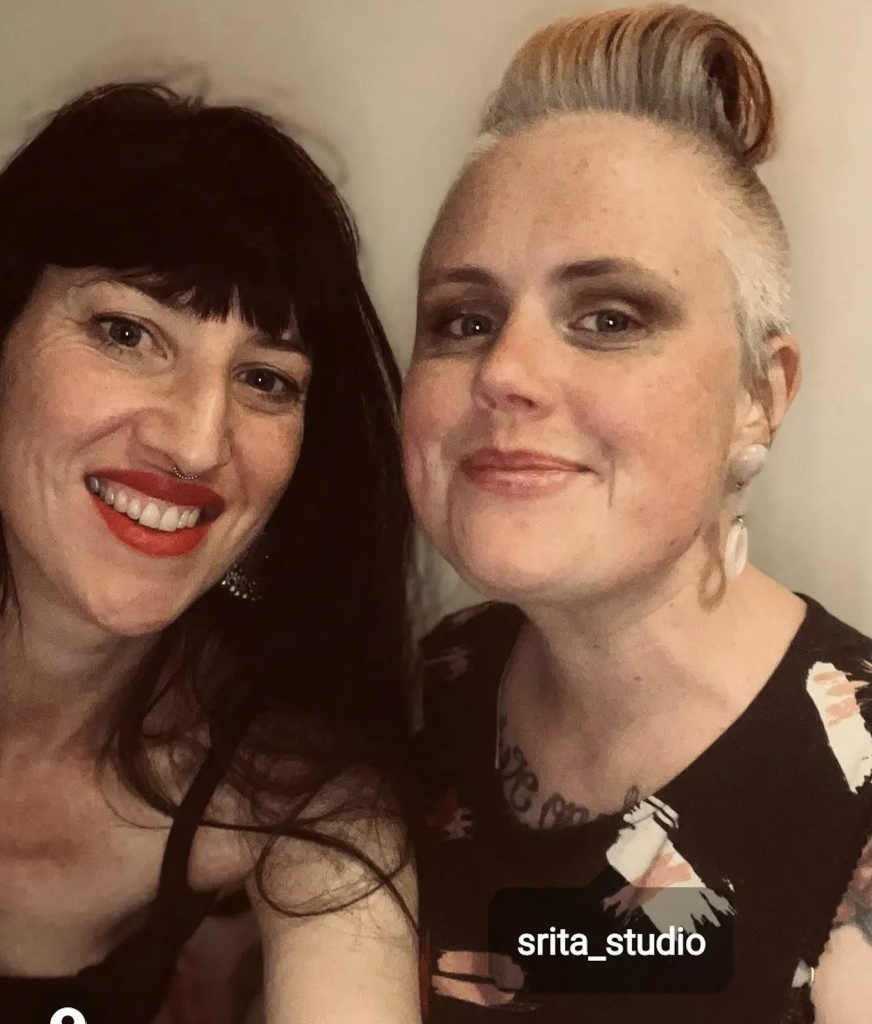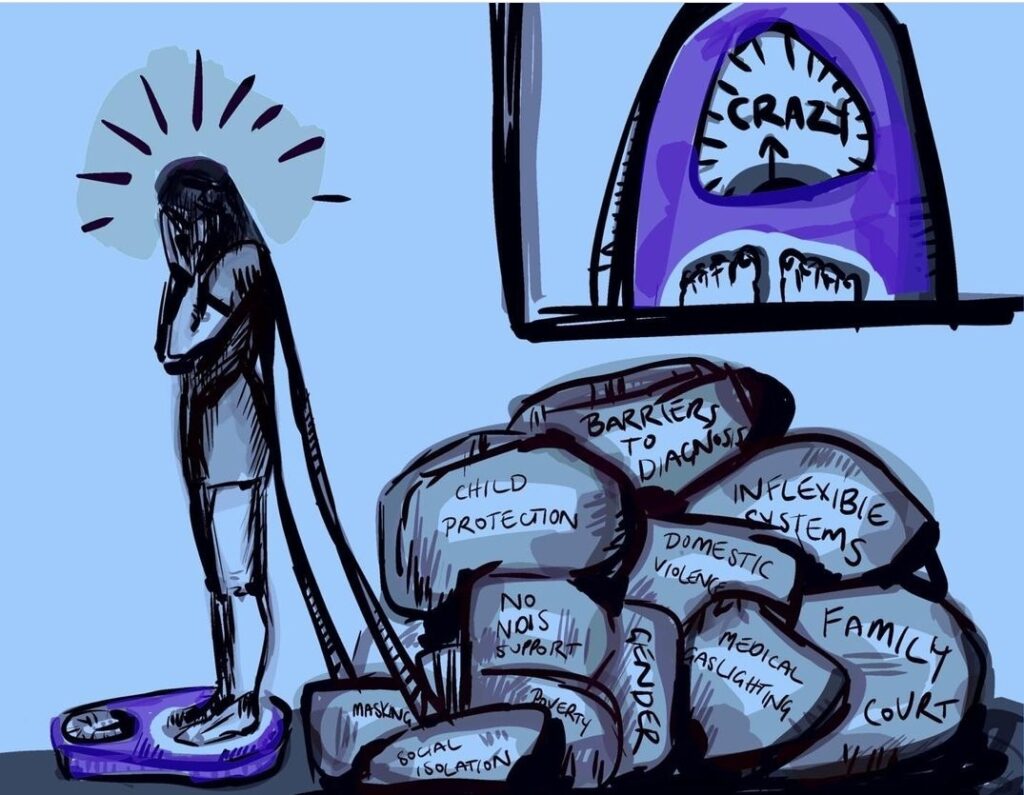By Sarah Langston
Suicide, sexual violence and medical gaslighting.
“Sometimes I feel like everybody is a sexy baby
(Anti-Hero, T Swift, 2022)
And I’m a monster on the hill;
Too big to hang out
Slowly lurching toward your favourite city
Pierced through the heart
But never killed.”
It’s me, hi. I’m the problem – it’s me.
These words from Taylor Swift’s song ‘Anti-Hero’ were much discussed in a women’s Autism community I’m a member of this week.
So many people related to the feelings of being shut out from social networks by discrimination and bias. Most women expressed feelings of chronic isolation and being the “fart in the elevator” in any given social situation.
Including me.
I’m an Individual Disability Advocate and commencing my Masters of Public and Social Policy next year. I spend my days supporting neurodivergent (ND) mothers in child protection and education matters, mostly, and I can tell you from the ground that we are having a really rough time out there.
The studies don’t lie: over and over they keep rolling in with stats that show that Autistic and ADHD women’s mental health is in crisis.
A lot of it is to do with the way we are routinely bullied and excluded from social networks, with confidence and impunity.
Autistic women are read as volatile, or cold, clinical, demanding; intense, emotional, erratic, inconsiderate, rude. The list of nastiness goes on and on, but here’s some experiences I’ve had recently, to give you a picture:
- People avoided me in person because my emails are long and prolific.
- People kicked me out of online communities because I question authority and challenge the status quo, ask too many questions, can’t process the rules, make mistakes because of my ND sense of time- or because I have fragmented, frequent communication (which is involuntary).
- People told me I’m being demanding, or that I expect too much.
- Friendships ended suddenly with no explanation and I have no idea why. Left only with the trauma of no clue – none – when a friendship of 14 years evaporates like it was never there. Reading and re reading and re reading the chat to try to figure out why it happened. And still having no idea.
- Having my choice of language read as suspicious by child protection when it’s just how my brain works. I like big long words. I don’t have the ability to just turn this off. I’m terrible at masking.
Another reason why mental health for Autie women is so terrible is to do with shocking rates of abuse against us, too- 9 out of 10 Autistic women have been sexually assaulted, according to one French study.
There is vast trauma within the sisterhood that we are carrying with little to no help to ease the burden.
Most of us experience yet more violence when we try to tap into formal support systems.
We are misunderstood by medical and legal staff and Autistic people in general are misread as deceptive (Lim, 2021, Flinders). As mothers we can be read as pestering, and exhausting, if our child has a problem and we need to seek help for them.
Our accounts of abuse are generally not believed. I remember a detective I tried to report sexual assault to, expressing exasperation because I talked at length. She needed to leave half an hour ago, she told me with disdain. I shut down. I got off the phone and cried, hard. It had happened again. It was devastating.
ABS stats nod towards the story we are living – people with psychosocial disabilities experience four times the rate of discrimination of people with other disabilities (2018). We are among that group.
So it’s unsurprising that our suicide stats are bleak as hell. They’re something like 20 times the rate of the average population. If our formal supports fail, and our community supports fail, what’s left for us?
Suffering. Misery. Harm. Poverty. Hospital. More abuse. Death.
Look, I’m not being dramatic here. This is really how it is for far too many ND women. I know it’s heavy to hear, but it’s heavier to live. I call this phenomenon – of some people being effectively cut off from both formal and informal support, combined with some of the highest rates of violence and abuse – ‘hyper marginalised disabilities’.
Though, recently, it’s been different for me. And not because of Neurotypical folk or anything they’ve done for me (sorry if that sounds bitter; but I am, just a touch.)
What changed?
My diagnosis in 2021 changed everything for me. Learning I was Autistic opened doors into community for me that have saved me from the isolation I was experiencing.
The response from other Autie women I’d known for a long time was “so you’ve finally realised!” and “welcome to the family – congratulations!”
Making friends with other Autistic women has been the breath in my lungs on days where trying to suck in air feels like an impossible task because everything is so.. much.

Photo of author, Sarah Langston and friend. Sarah, on the right has long dark hair with a fringe and is smiling. She is wearing bright red lipstick. Her friend, on the left has white blonde hair pushed back in a comb over. She is wearing long dangling earrings and a black top.
Here’s some situations this week that have made me feel connected, known, and as a result, safer and calm:
- Texting a friend while settling my child that I’m finding his nose clearing is excruciating and I’m trying to stay patient- and getting back a text saying yes omg yes, me too.
- Texting a mate that someone has yet again implied that I’m demanding because I was asking questions to try to understand something – and that mate sending me love and understanding, because it has happened to them too. I didn’t have to be in the despair hole alone again. The despair hole is dangerous and has nearly killed me, more than once.
- A friend called me as I was trying to get kid ready for school and I’m just about to have my own meltdown. My friend talked me down and understood both my feelings and his. My Autie mum friends don’t demonise my child, or me. They just empathise with everyone. They know it’s just hard all round and we are both doing our best.
Because they were that kid. And they’re mums too now. They know I just need support.
Sometimes we communicate solely in memes. Sometimes they tell me at length about their new hyper fixation and I listen in rapt interest. I really am interested. One of my favourite things is collecting the interests of my friends in my head in a big list. I love knowing this about them.
I feel safe with my Autie and ND mum friends. I really love them. We speak the same language. As a result of this, I cope so much better day to day. Here I don’t have to mask or try so damn hard to be understood.
It’s a break from being told I’m getting it all wrong.
Imagine if Autistic women and girls had this from the start. Imagine how much lower our suicide stats would be. Imagine how many of us would live life without tremendous fear and struggle. Our experiences of joy and connection would multiply.
I’m glad to see Yellow Ladybugs working hard on this with young women. It’s vital and I just wish it had been around longer. ND women and girls need each other so much to be happy and well.
Jen Hargrave of Women With Disabilities Victoria said recently at the National Disability Strategy Forum that we need to invest in community building, and I couldn’t agree more. Peer networks are protective against every form of violence and its impacts.
To my Autie sisters, my co Anti-heros-
It’s you. Hi. You’re the answer; it’s you. Thank you. Xx
Sarah Langston is a Neurodivergent artist, Disability rights advocate and activist. She works with hyper marginalised ND mothers at risk from discrimination in their contact with systems, as well as advocating on a systemic level. You can find more of Sarah’s work on her website.

